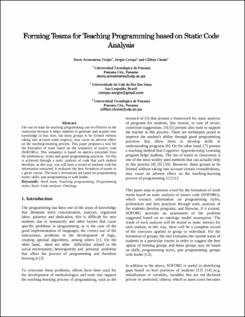El sistema se apagará debido a tareas habituales de mantenimiento. Por favor, guarde su trabajo y desconéctese.
Forming Teams for Teaching Programming based on Static Code Analysis
| dc.contributor.author | Arosemena-Trejos, Davis | |
| dc.contributor.author | Crespo, Sergio | |
| dc.contributor.author | Clunie, Clifton | |
| dc.date.accessioned | 2017-07-28T15:34:50Z | |
| dc.date.accessioned | 2017-07-28T15:34:50Z | |
| dc.date.available | 2017-07-28T15:34:50Z | |
| dc.date.available | 2017-07-28T15:34:50Z | |
| dc.date.issued | 2012-07-04 | |
| dc.date.issued | 2012-07-04 | |
| dc.identifier.uri | http://ridda2.utp.ac.pa/handle/123456789/1841 | |
| dc.identifier.uri | http://ridda2.utp.ac.pa/handle/123456789/1841 | |
| dc.description | The use of team for teaching programming can be effective in the classroom because it helps students to generate and acquire new knowledge in less time, but these groups to be formed without taking into account some respects, may cause an adverse effect on the teaching-learning process. This paper proposes a tool for the formation of team based on the semantics of source code (SOFORG). This semantics is based on metrics extracted from the preferences, styles and good programming practices. All this is achieved through a static analysis of code that each student develops. In this way, you will have a record of students with the information extracted; it evaluates the best formation of teams in a given course. The team's formations are based on programming styles, skills, pair programming or with leade | en_US |
| dc.description.abstract | The use of team for teaching programming can be effective in the classroom because it helps students to generate and acquire new knowledge in less time, but these groups to be formed without taking into account some respects, may cause an adverse effect on the teaching-learning process. This paper proposes a tool for the formation of team based on the semantics of source code (SOFORG). This semantics is based on metrics extracted from the preferences, styles and good programming practices. All this is achieved through a static analysis of code that each student develops. In this way, you will have a record of students with the information extracted; it evaluates the best formation of teams in a given course. The team's formations are based on programming styles, skills, pair programming or with leade | en_US |
| dc.format | application/pdf | |
| dc.language | eng | |
| dc.language.iso | eng | en_US |
| dc.rights | https://creativecommons.org/licenses/by-nc-sa/4.0/ | |
| dc.rights | info:eu-repo/semantics/openAccess | |
| dc.subject | Work team | en_US |
| dc.subject | Teaching programming | en_US |
| dc.subject | Programming styles | en_US |
| dc.subject | Static Code analyzer | en_US |
| dc.subject | Ontology | en_US |
| dc.subject | Work team | |
| dc.subject | Teaching programming | |
| dc.subject | Programming styles | |
| dc.subject | Static Code analyzer | |
| dc.subject | Ontology | |
| dc.title | Forming Teams for Teaching Programming based on Static Code Analysis | en_US |
| dc.type | info:eu-repo/semantics/article | |
| dc.type | info:eu-repo/semantics/publishedVersion |
